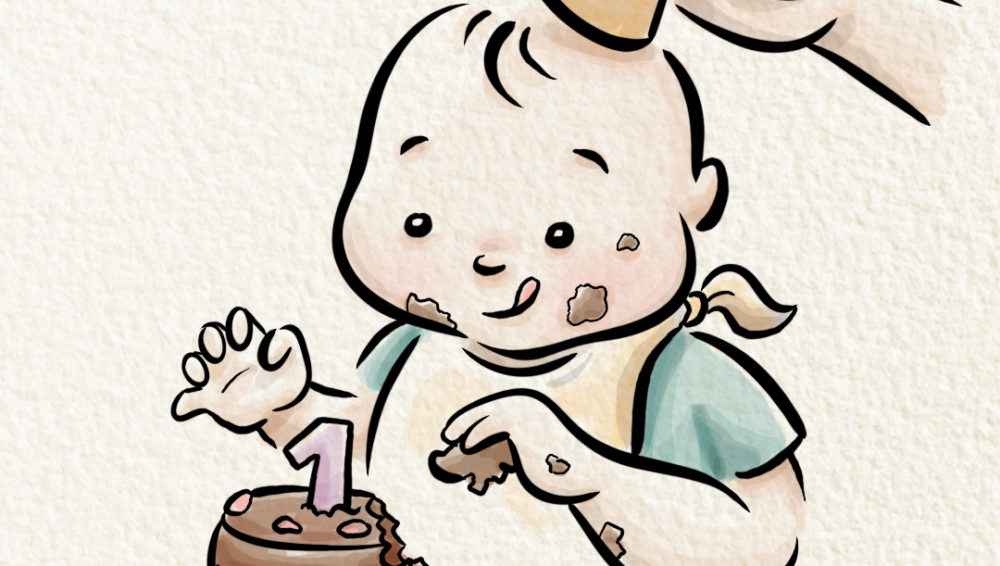Month 12: Child-centered parenting

Congratulations, Your Child turns 1 this month!
Your child’s physical development has been your primary indicator for progress in the past 12 months. But from this point on, you will get to witness the amazing flourishment of your little one’s cognitive and socio-emotional development.
How are you and your baby
In addition to the visible physical development, such as walking and playing with toys, much of Your Child’s development from now will happen internally. You will notice that Your Child starts to develop a passion for play — for example, putting objects of different sizes into a container or uncovering hidden objects. The little one may experiment with the same things over and over again or use different ways to explore the same item each time.
Your Child probably loves to make sounds or perform actions that invite responses from you, such as playing give-and-take or hide-and-seek games. Sharing activities with you will be Your Child’s new favorite choice of play — for example, banging cooking utensils together. The little one may even laugh wholeheartedly at a silly movement you perform.
But it’s not all fun. Preparing for the toddler years also involves some thoughtful discussions on different parenting styles. There is no best parenting style as families and circumstances are so different. The best practice is the one that holistically focuses on the child’s long-term health and well-being.
Understanding whole child pedagogy
Whole child pedagogy refers to a child-rearing practice that considers the child from mental, emotional, physical, and cognitive perspectives at the same time. The idea arises from the fact that there are many aspects of human potential that academics can’t measure. Besides curiosity and intelligence, children have to develop creativity, passion, resilience, intuition, confidence, generosity, mindfulness, humor, and many other important traits.
How to support the holistic growth of your child at home
Get comfortable with difficult emotions: Teaching emotional awareness to Your Child is an important first step in building the ability to regulate challenging feelings later in life. For example, if you want to take Your Child’s favorite toy away when it’s time to eat, tell the little one in advance so they can prepare emotionally. Once Your Child cries, comfort the little one with a hug, and explain about sadness, letting the little one know that you fully understand. Then, bring the attention towards something else. Giving Your Child time to prepare and the vocabulary for what’s passing through and not to be overwhelmed by emotions, as that leaves more room for logic and reasoning.
As parents, we can do our part. Learn to be comfortable with your child going through difficult emotions during a time they are lacking the vocabulary to explain themselves. Also set age-appropriate limits and boundaries to avoid unnecessary conflicts. Tell your wailing child that you understand that they are feeling upset for not getting to play with the sharp knife. Then, give a warm hug. This way, the child feels that you understand their feelings, even though the play was rejected.
In addition, try to be the role model — the person who you want your child to become. If you easily lose your temper or live in a difficult relationship, try to make sure Your Child is not suffering unnecessarily.
Be respectful to Your Child: Respecting children for who they are and what they long for is an integral part of whole child pedagogy. Children have their own feelings, passions, and opinions that may not align with your ideals.
Through careful observation, you may now begin to understand Your Child’s personality and can set the right environment for the little to unfold the intrinsic interests and passions. You may, for example, realize that Your Child gets easily irritated if there is too much going on and prefers quiet play instead. Respect that and don’t force your child to socialize. Also, you may realize that Your Child doesn’t like certain types of foods. Again, respect that. You are much better off with a picky eater than a child who eventually refuses to eat at all.
Allow your child to be bored: Interacting with you is the best way for your child to learn. However, there should be moments when Your Child is allowed to have personal space and time to learn to be alone. Playing alone or being bored sometimes helps with creativity, as children have to explore, think, and invent new ways of playing by themselves or with the same set of toys. Recognizing your child’s potential and ability to learn through unguided and unassisted explorations will help Your Child to build self-confidence and self-awareness.
Why does whole-child pedagogy matter
To consider your child wholly is truly understanding and accepting your child’s uniqueness and capabilities on both good and bad days. Teaching your child to know about themselves on every level, from feelings to needs, will allow them to develop a positive self-image and make them more capable of empathy and compassion toward others. When you give them space and time to grow, they will learn to understand how the world works, how they fit in, and how to become the best versions of themselves.
Verified:
Dr. Ketsupa Jirakarn (Mental health specialist) (18 February 2022)



